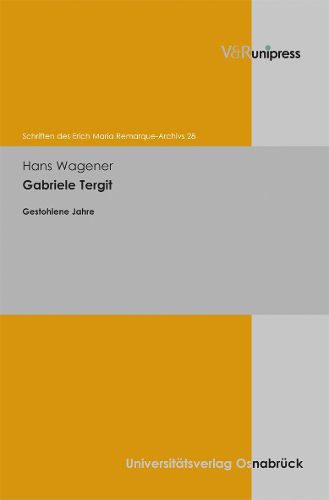Readings Newsletter
Become a Readings Member to make your shopping experience even easier.
Sign in or sign up for free!
You’re not far away from qualifying for FREE standard shipping within Australia
You’ve qualified for FREE standard shipping within Australia
The cart is loading…






English summary: Gabriele Tergit’s (1994-1982) novel ‘Kasebier erobert den Kurfurstendamm’ (1931) which deals with the Berlin life of the Weimar Republic was an immediate success. Forced to go into exile after the national socialist take-over of power, Tergit went first to Prague, then with her husband to Palestine and finally to England . There she was secretary of the German Exil PEN Club from 1957-1981. Her Jewish family saga ‘Effinges’, in many ways a Jewish counterpart to Thomas Mann’s Buddenbrooks, about the German Jewry in the 19th and 20th centuries, could not be published until 1951. The importance of Gabriele Tergit lies just as much in her exemplary life as a Jewish exile author, her continued literary work in exile and in her work as the secretary of the German PEN center in London. Thus the book does not only deal with the life and work of a German writer, but with a Jewish author from Berlin whose career was derailed by National Socialism, who, in spite of the vicissitudes of exile, ontinued to work. Her life and work have thus paradigmatic significance.German description: Gabriele Tergits (1894-1982) Roman uber das Berlin der Weimarer Republik Kasebier erobert den Kurfurstendamm (1931) war ein unmittelbarer Erfolg. Ihr judischer Familienroman Effingers, in vieler Hinsicht ein judisches Pendant zu Thomas Manns Buddenbrooks, konnte jedoch erst 1951 veroffentlicht werden. Durch die nationalsozialistische >Machtergreifung
$9.00 standard shipping within Australia
FREE standard shipping within Australia for orders over $100.00
Express & International shipping calculated at checkout
English summary: Gabriele Tergit’s (1994-1982) novel ‘Kasebier erobert den Kurfurstendamm’ (1931) which deals with the Berlin life of the Weimar Republic was an immediate success. Forced to go into exile after the national socialist take-over of power, Tergit went first to Prague, then with her husband to Palestine and finally to England . There she was secretary of the German Exil PEN Club from 1957-1981. Her Jewish family saga ‘Effinges’, in many ways a Jewish counterpart to Thomas Mann’s Buddenbrooks, about the German Jewry in the 19th and 20th centuries, could not be published until 1951. The importance of Gabriele Tergit lies just as much in her exemplary life as a Jewish exile author, her continued literary work in exile and in her work as the secretary of the German PEN center in London. Thus the book does not only deal with the life and work of a German writer, but with a Jewish author from Berlin whose career was derailed by National Socialism, who, in spite of the vicissitudes of exile, ontinued to work. Her life and work have thus paradigmatic significance.German description: Gabriele Tergits (1894-1982) Roman uber das Berlin der Weimarer Republik Kasebier erobert den Kurfurstendamm (1931) war ein unmittelbarer Erfolg. Ihr judischer Familienroman Effingers, in vieler Hinsicht ein judisches Pendant zu Thomas Manns Buddenbrooks, konnte jedoch erst 1951 veroffentlicht werden. Durch die nationalsozialistische >Machtergreifung